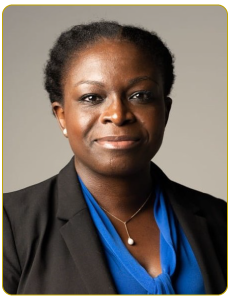 Nancy Ejuma, Ph.D., was drawn to public service. Born and educated in Cameroon in West Africa, with family members who worked for the U.N., Dr. Ejuma’s mother worked for the World Bank in Washington, D.C., but wanted her children to grow up in their homeland. After finishing grade school, Dr. Ejuma moved with her mother to the U.S., traveling back and forth until her early 20s, attending school in the states and spending summers in Cameroon.
Nancy Ejuma, Ph.D., was drawn to public service. Born and educated in Cameroon in West Africa, with family members who worked for the U.N., Dr. Ejuma’s mother worked for the World Bank in Washington, D.C., but wanted her children to grow up in their homeland. After finishing grade school, Dr. Ejuma moved with her mother to the U.S., traveling back and forth until her early 20s, attending school in the states and spending summers in Cameroon.
A serious illness during her travels as a teen caused her to access health care both here and abroad. The experience greatly influenced her career path. “I spent a lot of time thinking about all of the health care experiences that I had in both places, so when it came time for me to decide what I wanted to study, it was just a no-brainer that I would end up in international health care,” Dr. Ejuma says.
Today, Dr. Ejuma is deputy director and chief of operations for the Williamson County and Cities Health District in Texas. She previously served as the deputy associate commissioner for regional and local health operations within the Texas Department of State Health Services (DSHS), the immunization unit director within Texas DSHS, and the immunization program manager for the D.C. Department of Health.“
At first, I thought I wanted to be an infectious disease doctor, chasing infectious diseases across Africa, she said. “Between yellow fever and malaria and other things, we’d really just seen it all.” Instead, she was drawn to public service, choosing to work as a health care professional in government with the opportunity—especially based in Washington, D.C.—to impact the lives of people from all over the world.
Her desire to hone her management skills and better lead well-funded, operationally strong organizations inspired her to earn an MBA focused on health care from Yale University, where she was one of few students in the program representing the public sector.
Meanwhile, her early experiences in the U.S. and West Africa continued to fuel her interest in international health care and specifically, the psychology behind the choices people make about preventative medicine—the types of care patients consider and how long it takes them to seek it. With a growing interest in psychology, Dr. Ejuma researched graduate programs that offered an international perspective and an appreciation for what can be learned from global communities.
“My early experiences taught me that everybody has a piece to the puzzle, whether it’s the European academic model, or the U.S. and Canadian, or African, Southeast Asian, etc., everyone really contributes,” Dr. Ejuma says. “I wanted a program that honored that, and I fell in love with the international psychology doctorate program at The Chicago School for that reason.”
Two international trips to study behavioral health systems in other countries were particularly impactful to Dr. Ejuma. “I went to São Paulo, Brazil, and learned how they sourced from community health care worker models for behavioral and mental health intervention. I then went to Shanghai, China, to study the connection between Eastern and Western medicine, between the body and the mind. We have so much respect for the knowledge that these communities have with their own history and the fact that they’re giving us new tools.”
As a doctoral student at The Chicago School, Dr. Ejuma’s dissertation focused on the psychology behind vaccine hesitancy across cultures, a topic that equipped her to address initial resistance to the COVID-19 vaccines during the global pandemic.
“We saw a lot of the same things when the COVID-19 vaccines were first made available,” Dr. Ejuma says. “We had to use the data to understand where people were, and then have specific messages crafted to appeal to the types of concerns they had. We relied on behavioral communication and behavioral intervention to temper people’s anxiety but also have specific outcomes, like high vaccination rates [when it was] in their best interest.”
Her advice to those considering a doctorate in psychology? “I absolutely encourage them to look at The Chicago School. It was a very high-quality experience from beginning to end. Everything from speaking with the recruiters, and the advisers who explained the different pathways you can take and the different programs that are available. The dissertation process was eye opening because of the amount of flexibility that we had in terms of the types of topics we could pursue, but also the quality of the people that we were able to bring on the committees from different organizations in D.C. It was a very, very positive experience.”
Learn more about The Chicago School
To learn more about academic programs at The Chicago School, fill out the information below to request more information. You can also apply today through our application portal here.

